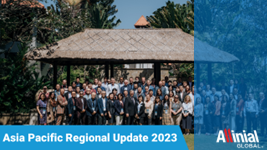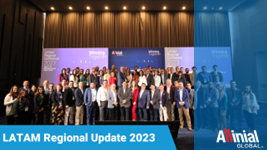What You’re Doing Right, What’s Probably Missing, and How Allinial Global Can Help
Allinial Global was thrilled to welcome world-renowned technology and finance leader Kimberly Ellison-Taylor as the opening keynote speaker at the recent Executive Team Conference 2022. Covering a variety of important trends affecting the accounting profession, Kimberly’s presentation touched on a topic that is near and dear to our hearts: diversity, equity, and inclusion (DEI).
Why DEI?
During her powerful keynote, Kimberly shared the slide below and asked a thought-provoking question. If you believe that everyone starts at the same place, by show of hands, how many would choose to be a black woman today?

Nobody raised a hand, and in the uncomfortable silence that followed, Kimberly pointed out that this would not be the case if the same opportunities and privileges were indeed afforded to everyone.
Acknowledging the fact that everyone comes from different backgrounds and experiences requires us to do some perspective-shifting. It means we need to change how we think about talent, for example. And while learning how to support your staff on a more individualized level may seem daunting, consider how much more your team could accomplish if you truly enabled, empowered, and expected excellence for every single person on it.
Poised for Innovation
Kimberly urged firm leaders to think broadly about diversity and remember that it goes beyond the often-discussed factors of race, gender, age, and sexuality. Diversity also encompasses religious beliefs, disabilities, and differences in thought and opinion. Making space for all of these things sets the stage for innovation.
Organizations that represent a wide variety of perspectives are stronger, and including people who would otherwise be considered outliers can help today’s firms challenge their thinking. One great way to pursue diversity within your firm is to consider hiring talent from nontraditional backgrounds such as art or history majors. Their unique perspectives could be a great fit for advisory services, for example.
As Kimberly pointed out, pursuing diversity, equity, and inclusion isn’t just the right thing to do—it makes business sense too. Everyone benefits from DEI initiatives that create a culture where people feel empowered to speak up, ask questions, and share their ideas.
The Importance of Inclusion
Another insight that Kimberly shared is to remember the “I” in DEI. Diversity is important, but no one will stay if your firm culture is toxic. Therefore, inclusion is a must for firms that want to benefit from the strength of different viewpoints.
Inviting different perspectives and including people who think differently gives firms important opportunities to shake things up and answer hard questions, like “Why are we doing it this way?” At the same time, these kinds of conversations can make people uncomfortable, which is why it’s so important to cultivate an inclusive and welcoming work environment.
Giving—and Getting—Grace
No matter where your firm is in its DEI journey, it’s important to offer yourself and others grace. To address DEI, we need to learn how to get comfortable with being uncomfortable, and one of the easiest ways to encourage that is to be open to giving and receiving grace when anyone falls short.
Psychological safety is essential to helping people navigate the uncomfortable and vulnerable moments that are part of DEI work. Kimberly encouraged everyone to choose not to be offended and instead see difficult conversations as opportunities for growth. She explained that this is particularly important for leaders, because younger generations want to know their leaders are human—and they pay close attention to how leaders handle challenging situations.
For example, Kimberly shared a mistake she made when one of her sons called her out for using the expression “sit Indian style.” He corrected her by saying, “Mom, do you mean crisscross-applesauce?” Acknowledging mistakes is a necessary part of growth and transformation, so we need to be prepared for inevitable missteps and willing to say “I’m sorry. I was wrong.”
Where Do We Go from Here?
Kimberly started her session by comparing CPAs to firefighters. As the ultimate trusted advisors, CPAs are the ones who figure out how their clients are going to stay profitable, enter new markets, and transform business models. We have to drink our own champagne, she said. DEI initiatives overlap with many other key concerns like leadership, succession planning, and business culture, so they represent a huge opportunity to model what real progress looks like.
And in the spirit of drinking our own champagne, Allinial Global is redoubling our effort to support member firms in their DEI initiatives. Earlier this year, we donated to the AICPA’s George Willie Scholarship and the Scholarship Fund administered by ACCA to create new opportunities for diverse talent in the accounting profession.
To further advance our member firms’ commitment to DEI, we will be implementing Kimberly’s advice of partnering with historically black colleges and universities (HBCUs) to address recruiting challenges. With Kimberly’s help, Allinial Global will be hosting a meeting focused on building successful partnerships between AG member firms and business deans and other key groups within HBCUs.
We are excited about facilitating such an important conversation and helping Allinial Global members create new opportunities for diverse talent to grow and advance in their firms. We have identified a few schools as potential partners already, and we look forward to reporting back in the next several months to update you on our progress.







